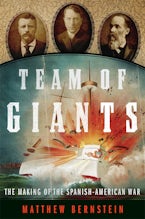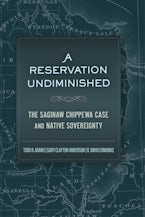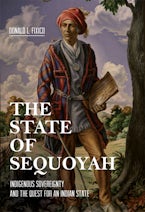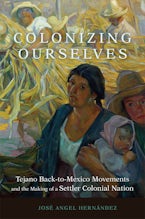History Test
History Header
Showing results 1-10 of 1868
Filter Results OPEN +

Team of Giants
The Making of the Spanish-American War
A stirring narrative built on rigorous research, Team of Giants is a fresh account of the role the martial ambitions of these men played in a war that would launch the American Century and set each man on the path to his own place in history.
A Reservation Undiminished
The Saginaw Chippewa Case and Native Sovereignty
Reservation Undiminished presents a cohesive narrative of a legal case that testifies to Native persistence in asserting territorial sovereignty in the twenty-first century—and that highlights the potential for conflict resolution in seemingly intractable legal struggles between state, local, and tribal governments.
Last One Walking
The Life of Cherokee Community Leader Charlie Soap
The Native American fight for land has been well-chronicled, but the fight for water has not. Last One Walking helps to fill that void with a narrative that is also deeply moving, revealing on every page the spirit of ga-du-gi.
Ski, Climb, Fight
The 10th Mountain Division and the Rise of Mountain Warfare
Intertwining the history of the World War II 10th Mountain Division and US mountain warfare with the history of American skiing and mountaineering, Ski, Climb, Fight is at once an unprecedented, in-depth account of one of the most celebrated military units of World War II and a fresh look at US mountain warfare from its inception eighty years ago to our own day.
Neocolonial
Inventing Modern Latin American Nations, Mayer Center Symposium XX
In the first half of the 1900s, Latin American artists, architects, and designers searched for visual languages that matched the modern identities of their young nations. Surprisingly, many found their...
From Peasant Struggles to Indian Resistance
The Ecuadorian Andes in the Late Twentieth Century
Drawing on extensive research in her native Ecuador, Amalia Pallares examines the South American Indian movement in the Ecuadorian Andes and explains its shift from class politics to racial politics in the late twentieth century. Pallares uses an interdisciplinary approach to explore the reasons why indigenous Ecuadorians have bypassed their shared class status with other peasant groups and movements in favor of a political identity based on their unique ethnicity as Indians.
Forty Years a Legislator
Thomas’s panoramic look at the issues of his time includes a behind-the-scenes view of the Nürnberg War Crimes Trial and also tells how he helped push funding for the atomic bomb project through Congress without disclosing its true nature. Thomas dedicated his career to improving the lot of rural residents, Native Americans, and working people. Forty Years a Legislator is a rich source of insight for all concerned with twentieth-century politics or the early years of Oklahoma statehood.
The State of Sequoyah
Indigenous Sovereignty and the Quest for an Indian State
Few people today know that the forty-sixth state could have been Sequoyah, not Oklahoma. The Five Tribes of Indian Territory gathered in 1905 to form their own, Indian-led state. Researched and interpreted by distinguished Native historian Donald L. Fixico, this book tells the remarkable story of how the state of Sequoyah movement unfolded and the extent to which it remains alive today.
A Life Cut Short at the Little Big Horn
U.S. Army Surgeon George E. Lord
A portrait of a singular figure in the milieu of the American military’s nineteenth-century medical elite, A Life Cut Short at the Little Big Horn offers a close look at a familiar chapter in U.S. history, and a reminder of the humanity lost in a battle that resonates to this day.
Colonizing Ourselves
Tejano Back-to-Mexico Movements and the Making of a Settler Colonial Nation
In the late nineteenth century, the Mexican government, seeking to fortify its northern borders and curb migration to the United States, set out to relocate “Mexico-Texano” families, or Tejanos, on Mexican land. In Colonizing Ourselves, José Angel Hernández explores these movements back to Mexico, also known as autocolonization, as distinct in the history of settler colonization.

Team of Giants
The Making of the Spanish-American War
A stirring narrative built on rigorous research, Team of Giants is a fresh account of the role the martial ambitions of these men played in a war that would launch the American Century and set each man on the path to his own place in history.
A Reservation Undiminished
The Saginaw Chippewa Case and Native Sovereignty
Reservation Undiminished presents a cohesive narrative of a legal case that testifies to Native persistence in asserting territorial sovereignty in the twenty-first century—and that highlights the potential for conflict resolution in seemingly intractable legal struggles between state, local, and tribal governments.
Last One Walking
The Life of Cherokee Community Leader Charlie Soap
The Native American fight for land has been well-chronicled, but the fight for water has not. Last One Walking helps to fill that void with a narrative that is also deeply moving, revealing on every page the spirit of ga-du-gi.
Ski, Climb, Fight
The 10th Mountain Division and the Rise of Mountain Warfare
Intertwining the history of the World War II 10th Mountain Division and US mountain warfare with the history of American skiing and mountaineering, Ski, Climb, Fight is at once an unprecedented, in-depth account of one of the most celebrated military units of World War II and a fresh look at US mountain warfare from its inception eighty years ago to our own day.
Neocolonial
Inventing Modern Latin American Nations, Mayer Center Symposium XX
In the first half of the 1900s, Latin American artists, architects, and designers searched for visual languages that matched the modern identities of their young nations. Surprisingly, many found their...
From Peasant Struggles to Indian Resistance
The Ecuadorian Andes in the Late Twentieth Century
Drawing on extensive research in her native Ecuador, Amalia Pallares examines the South American Indian movement in the Ecuadorian Andes and explains its shift from class politics to racial politics in the late twentieth century. Pallares uses an interdisciplinary approach to explore the reasons why indigenous Ecuadorians have bypassed their shared class status with other peasant groups and movements in favor of a political identity based on their unique ethnicity as Indians.
Forty Years a Legislator
Thomas’s panoramic look at the issues of his time includes a behind-the-scenes view of the Nürnberg War Crimes Trial and also tells how he helped push funding for the atomic bomb project through Congress without disclosing its true nature. Thomas dedicated his career to improving the lot of rural residents, Native Americans, and working people. Forty Years a Legislator is a rich source of insight for all concerned with twentieth-century politics or the early years of Oklahoma statehood.
The State of Sequoyah
Indigenous Sovereignty and the Quest for an Indian State
Few people today know that the forty-sixth state could have been Sequoyah, not Oklahoma. The Five Tribes of Indian Territory gathered in 1905 to form their own, Indian-led state. Researched and interpreted by distinguished Native historian Donald L. Fixico, this book tells the remarkable story of how the state of Sequoyah movement unfolded and the extent to which it remains alive today.
A Life Cut Short at the Little Big Horn
U.S. Army Surgeon George E. Lord
A portrait of a singular figure in the milieu of the American military’s nineteenth-century medical elite, A Life Cut Short at the Little Big Horn offers a close look at a familiar chapter in U.S. history, and a reminder of the humanity lost in a battle that resonates to this day.
Colonizing Ourselves
Tejano Back-to-Mexico Movements and the Making of a Settler Colonial Nation
In the late nineteenth century, the Mexican government, seeking to fortify its northern borders and curb migration to the United States, set out to relocate “Mexico-Texano” families, or Tejanos, on Mexican land. In Colonizing Ourselves, José Angel Hernández explores these movements back to Mexico, also known as autocolonization, as distinct in the history of settler colonization.











